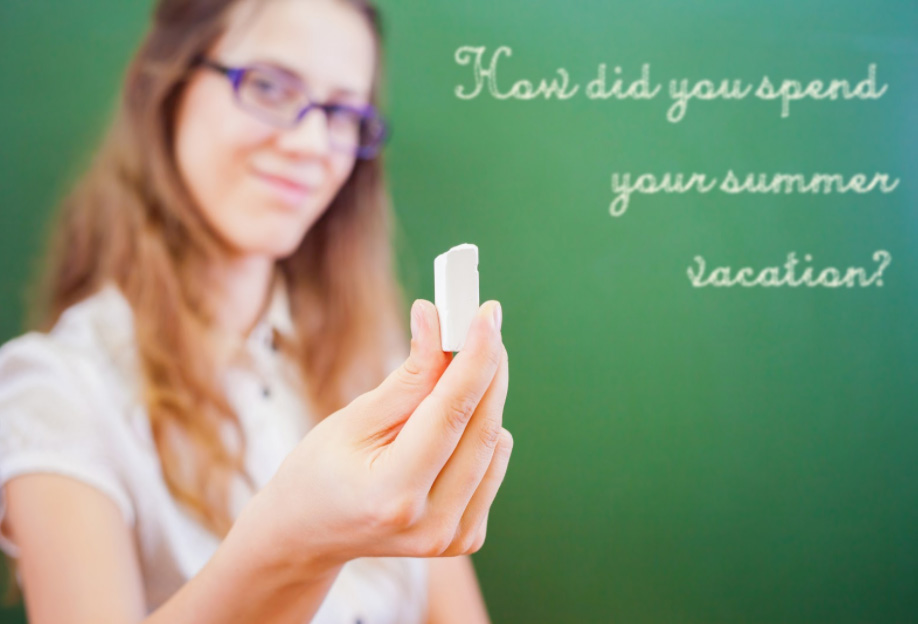Honing Your Craft During the Dog Days of Summer
Introduction | Background Knowledge | Activities | Extensions

Introduction
Teachers make approximately 1,500 decisions every day, more than a brain surgeon. Add that to the concern about our students that keeps us up at night and the grading and the planning. We do a year’s worth of work in 180 days! As we approach summer, we need a break! Teachers are tired, and teachers are worried. So, take your break. Take a few weeks to unwind and refresh. But, teachers are lifelong learners, and we all know that by about the Fourth of July, we are starting to think about the new year.
Background Knowledge

Summer is a great time to learn something new and is the perfect time to read something that will get you excited about the new year. The Internet is a treasure trove of professional development opportunities, but it can be overwhelming to wade through the search results. From inspiring books to free classes, check out these ideas for continuing to learn while your mind and body enjoy summer vacation.
Activities

Read a New Book
- Professional Books
- Relentless by Hamish Brewer (ISBN 9781949595345) The tattooed, skateboarding principal will change the way you think about teaching children. Mr. Brewer is all-in for children and will make you want to be too. His unconventional approach is student-centered. He focuses on teamwork, respect, and love. He will encourage you to challenge the status quo to be your very best. Get inspired or renew your passion with Hamish Brewer’s TED Talk.
- Go See the Principal by Gerry Brooks (ISBN 9780738285061) When Principal Gerry Brooks speaks to auditoriums full of educators, they walk away inspired and with 1.5 recertification points. This book reads like his presentations, and the reader can hear his voice in his writing. Mr. Brooks believes that a change in climate and culture in a building, starting with the principal and trickling down to the students, is what makes a school great. He understands what teachers need to be happy at work, and he embraces that happy teachers lead to happy, successful students. He addresses this at school Climate and Culture from an Educator, but this is still my favorite video.
- The Book Whisperer by Donalyn Miller (ISBN 9780470372272) Donalyn Miller believes that every student is a reader and that a great teacher can awaken and inspire that reader. Her reading workshop approach allows for student choice and focuses on authentic conversations and moves away from 5 question comprehension quizzes. Ms. Miller will get you excited about reading and will get you excited to teach your community of readers.
- Teach Like a Pirate by Dave Burgess (ISBN 9780988217607) Focusing on student engagement and building relationships; this book can transform your teaching. It includes checklists to make sure that your lessons are exciting and engaging for students. There is an entire chapter on how to hook your students.
- The Graide Network published The Ultimate Guide to Summer Reading for Teachers. This guide includes books for professional development (The Book Whisperer is on the list), a list of teacher recommended books with professional and fun options, readings about education technology, and more! This guide is your one-stop resource to build a summer reading list!
- Children’s Books
- Check out the list of ALA’s Notable Books. The Newbery Medal is awarded for the most outstanding contribution to children’s literature. The New Kid by Jerry Craft (ISBN 9780062691194) also won the Coretta Scott King Award; the story tells of an African-American boy who is the new kid at a predominantly white school outside of his neighborhood. It is the first graphic novel to win this prestigious award. The poignant and timely story brings race in America to the forefront. The Undefeated by Kwame Alexander (ISBN 978-1328780966) is a Caldecott Medal winner, which is the most distinguished American picture book for children. This book, written in poem form, is a tribute to African American history, strength, and resilience from the horrors of slave ships to Black Lives Matter.
- Take a look at the ALSC’s Notable Children’s Book List. This graded list includes books that are considered to be "of especially commendable quality."
- Young Adult Books
- Check out this Amelia Elizabeth Walden Award Winning book! Lovely War by Julie Berry (ISBN 9780451469939) is set in World War 1 and centers around the themes of relationships, war, and trauma, but the greatest of these is love.
- Dig by A.S. King (ISBN 978-1101994917) is an ALA’s Printz Award winner, recognizing excellence in literature written for young adults. Families are complex, and many will go to great lengths to cover up secrets. In this book, five cousins in the Hemmings family begin to pull at the strings, and the family secrets begin to come to light. This look into systematic racism and white supremacy is timely and important.
- Choose a book from the YALSA list of Best Fiction for Young Adults. The top ten picks are denoted with an asterisk. Lovely War is included and denoted with an asterisk.
Take a Class
- Teacher Institutes
- Many of the deadlines for summer institutes have passed, but keep these in mind for next summer. Most institutes have a March deadline.
- The Library of Congress Teacher immerses teachers in primary sources and how to use them in the classroom. The institute is free, but participants are responsible for lodging and meals.
- National Endowment for the Humanities Summer Programs - Spanning a variety of topics, these summer programs are free for educators and include a stipend for food and lodging.
- Check your closest historical site to see if it offers a summer institute. Most are about a week long. There are grants and scholarships available to help if there is tuition. Some may have online options, like this one from Colonial Williamsburg.
- Each of the Smithsonian Institute Museums offers professional development. There is no cost associated with the program, but participants provide food and lodging.
- Online Classes
- Get your Certified Google Educator certification. There is a $10 exam fee. All of the resources and training are free.
- Take a free Edtech workshop through OK2Ask. These 90-minute workshops focus on one EdTech tool and allow for exploration and provide suggestions for how to implement the tools immediately.
- NEA offers many professional development suggestions.
- Check your state Department of Education for professional development opportunities. In my state, the DOE offers six different 6-week seminars three times a year. They focus on technology in the classroom. Look to see if yours offers the same.
- National Geographic has professional development to help enhance science instruction.
- ASCD Webinars - ASCD has current and archived webinars on a variety of topics.
Extensions

It is always more fun to learn in a community. Gather your teacher friends, in person or virtually, and make your own professional learning community. You can meet at a restaurant or out at someone’s pool. Get together virtually with your teacher and administrator friends from around the country. You will be amazed at how geography can shape your thoughts, and sharing a variety of experiences can make each of you better teachers.
-
Professional Book Study
- Choose a book from the list of professional resources above.
- As you discuss each chapter or the book as a whole, talk about how these resources can change your practice and one thing that you can do in September to be a better teacher.
- Meet again each quarter for accountability. Discuss what is working and what is not working. Adjust your plan and continue to grow and evolve as an educator.
-
Book Club
- Choose a book from the children’s book or Young Adult book list above.
- If you choose children’s books, take turns reading a book aloud to the group. (Each person chooses a book to share at the meeting.) Work together to determine how you can put the book to work. Is the book a perfect fit for a specific skill you are teaching? (Does it have a strong main character that you can use as a model to teach traits and feelings? Does it have a very obvious problem and solution?) Could you use the book to activate prior knowledge for a topic? Is this a book that can spark some discussion to lead into a topic or wrap up a topic?
- If you choose young adult books, read them for pleasure. Host a book club just like you would do with an adult book. Think about how it feels. Think about what worked in the book club and what did not. How can you use this experience in your classroom? Did you skip the last chapter? How did you feel? Did you dislike the book and want to stop reading on every page? How did you feel? How can this experience inform your instruction?
